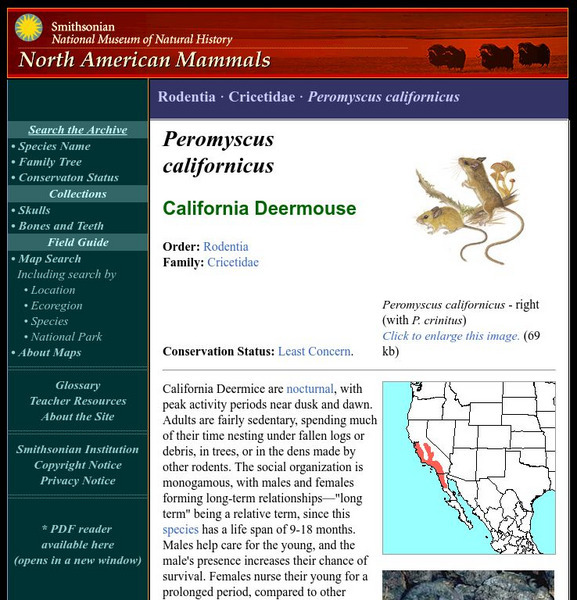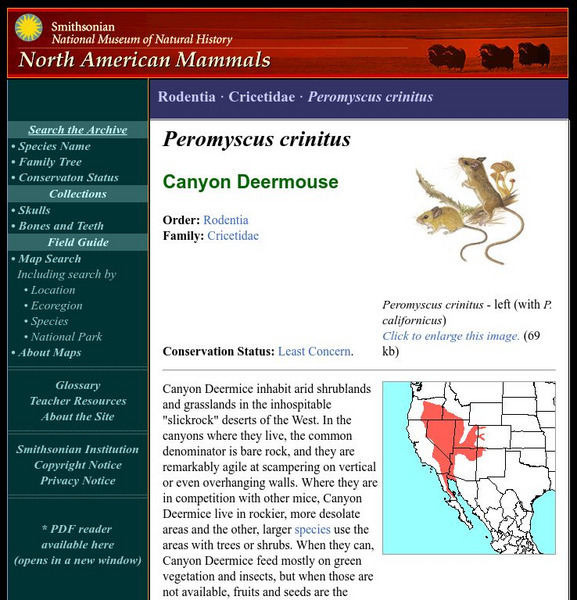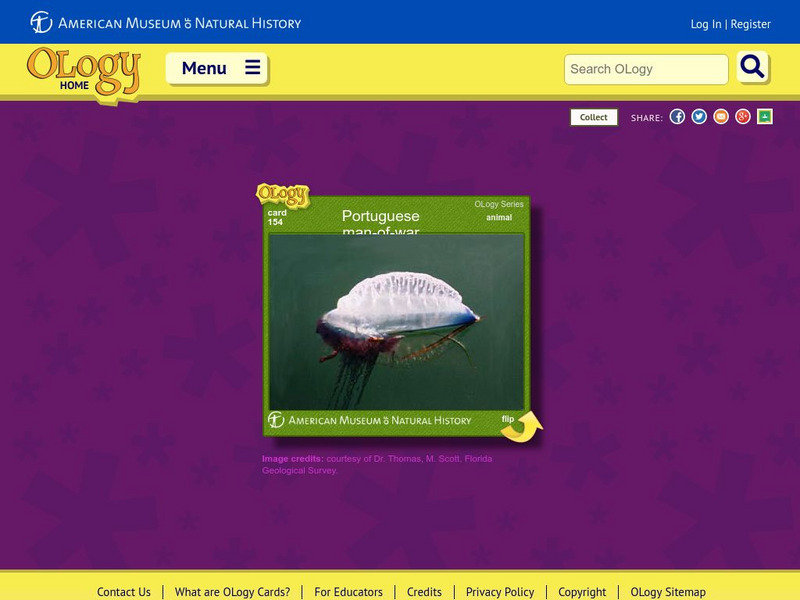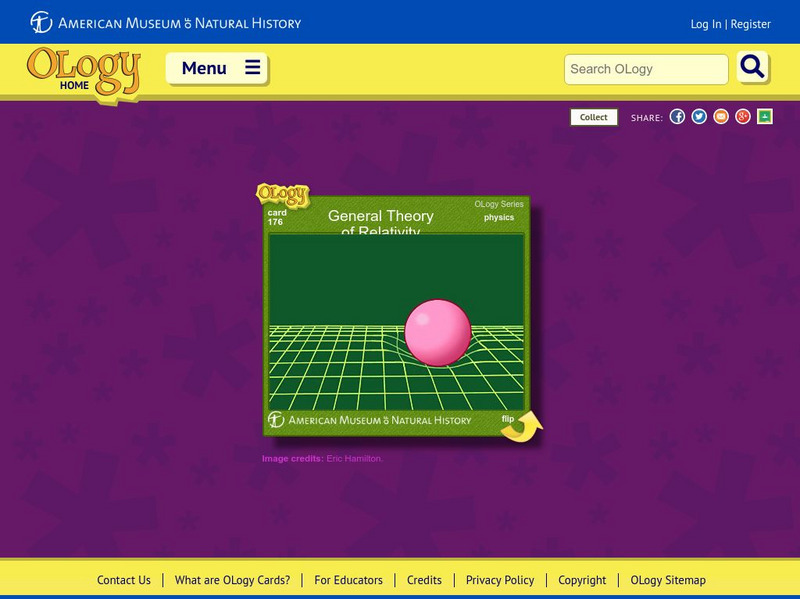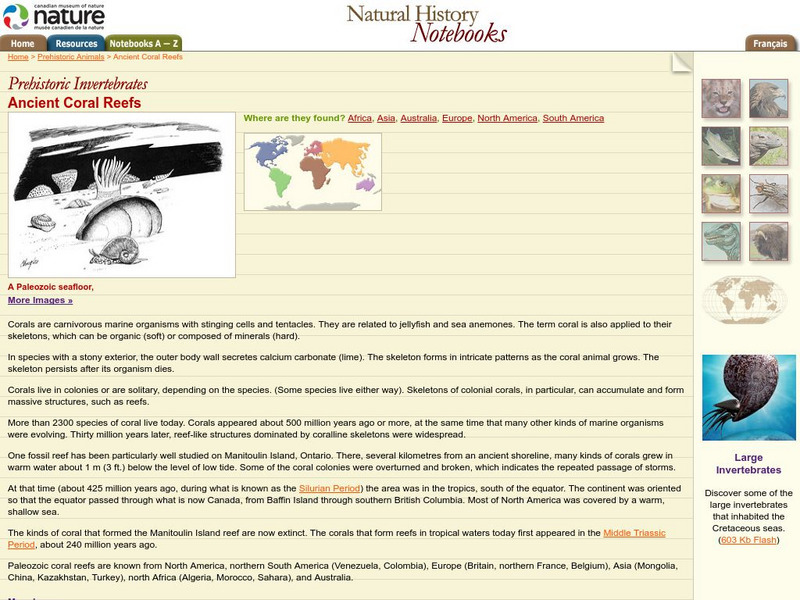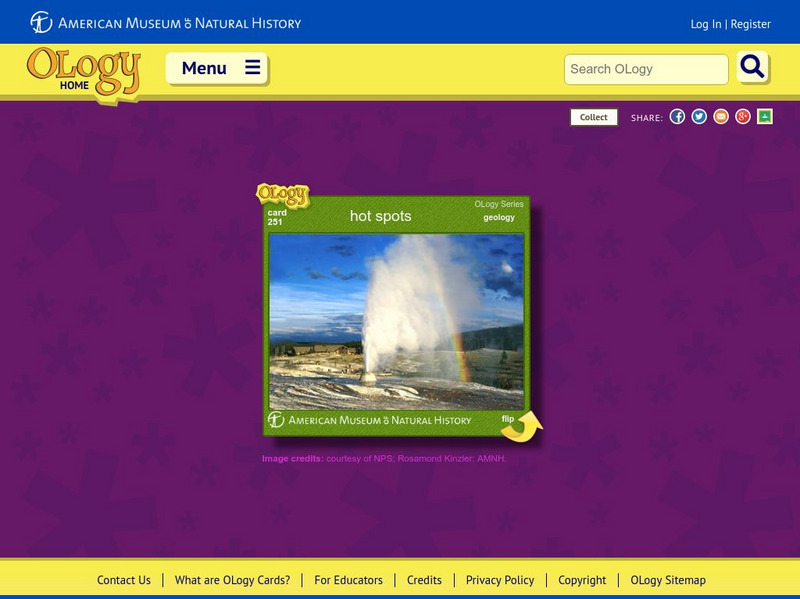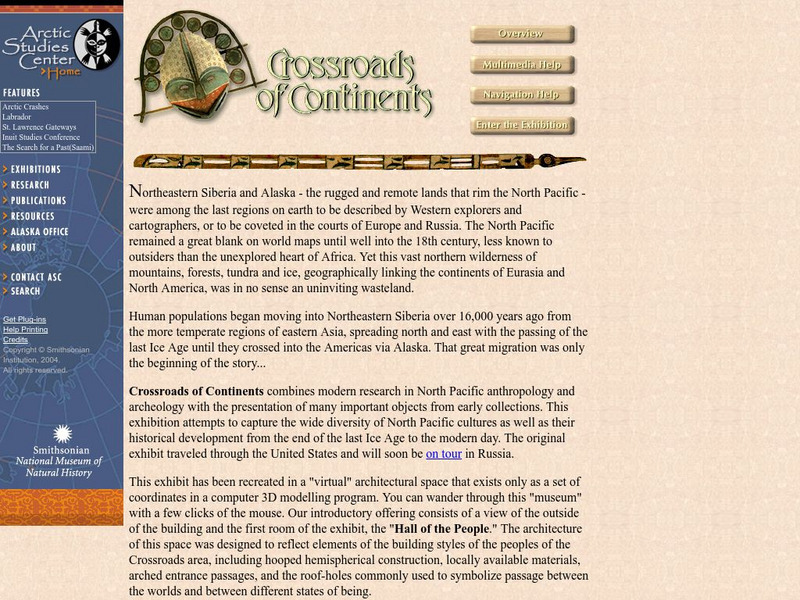Hi, what do you want to do?
Smithsonian Institution
National Museum of Natural History: Giant Squid Resurfaces
The National Museum of Natural History?s giant squid exhibit has reopened, and this website explores some of the more recent discoveries on this very elusive yet very intriguing animal.
Smithsonian Institution
National Museum of Natural History: American Mammals: Banner Tailed Kangaroo Rat
The Banner-tailed Kangaroo Rat confines its activities to small areas near the large earthen mounds that contain its complex burrow systems. Usually gentle and timid, this Kangaroo Rat will fight furiously to defend its territory from...
American Museum of Natural History
American Museum of Natural History: O Logy: Saving Species
Learn why fieldwork is an important component of any scientist's career, especially among those who are actively working to preserve the Earth's biodiversity. Three American Museum of Natural History biologists tell you about their...
Smithsonian Institution
National Museum of Natural History: American Mammals: California Deermouse
California Deermice are nocturnal, with peak activity periods near dusk and dawn. Adults are fairly sedentary, spending much of their time nesting under fallen logs or debris, in trees, or in the dens made by other rodents. Learn more...
Smithsonian Institution
National Museum of Natural History: American Mammals: Canyon Deermouse
Canyon Deermice inhabit arid shrublands and grasslands in the inhospitable "slickrock" deserts of the West. In the canyons where they live, the common denominator is bare rock, and they are remarkably agile at scampering on vertical or...
Smithsonian Institution
National Museum of American History: Fishing for a Living: The Salmon Coast
This resource provides information about the Pacific Northwest and the cultures of people who inhabited the area.
Smithsonian Institution
National Museum of Natural History: African Voices: History
Trace Africa's history from the earliest humans to modern times using this thematic timeline. Learn about African trade, religion, empires, and technology. Vibrant pictures are included for each time period showcasing the African culture.
American Museum of Natural History
American Museum of Natural History: Nature Versus Nurture O Logy Card
Flip this interactive OLogy card to find questions and answers, fast facts, and other bite-size pieces of information to help you understand the nature-versus-nurture debate.
American Museum of Natural History
American Museum of Natural History: Dinosaurs: Display or Defense?
Are plates of armor, horns, exceptionally large heads, and bony plates examples of dinosaur display or defense? Visitors to this resource will learn what scientists have concluded about the purpose of these peculiar dinosaur features.
American Museum of Natural History
American Museum of Natural History: Ring of Fire O Logy Card
Flip over this interactive OLogy flash card to read about the Ring of Fire, a series of volcanoes in the Pacific Ocean along the Pacific Plate.
American Museum of Natural History
American Museum of Natural History: Portuguese Man of War O Logy Card
Turn over this interactive card and start learning bite-size pieces of useful information about the Portuguese man-of-war, such as its diet, habitat, and physical characteristics.
American Museum of Natural History
American Museum of Natural History: O Logy: Train of Thought
Try out your ability to think like Einstein by working through two thought experiments that help explain how satellites stay in orbit and how the speed of light affects the universe.
American Museum of Natural History
American Museum of Natural History: General Theory of Relativity O Logy Card
Einstein's general theory of relativity is the subject of this interactive OLogy card. Turn it over to find fast facts, questions and answers, and other bite-size pieces of information about the theory.
American Museum of Natural History
American Museum of Natural History: Dinosaurs: Theropod Biomechanics
How fast could a Tyrannosaurus rex really run? Visitors to this resource will see how scientists use theropod biomechanics to simulate the movement of these large dinosaurs.
Smithsonian Institution
National Museum of Natural History: The Allure of Pearls
Exhibition of some of the first known gems to early humans, this collection of pearls includes several world famous precious stones.
American Museum of Natural History
American Museum of Natural History: Ole Roemer and the Speed of Light
This resource provides a concise overview of the speed of light and the Ole Roemer, the first man to measure it.
Smithsonian Institution
National Museum of Natural History: The Splendor of Diamonds
Describes past exhibition of some of the finest gems in the world, this collection of precious diamonds includes several rare and valuable stones.
American Museum of Natural History
American Museum of Natural History: Resources for Learning: Frames of Reference
Use this interactive physics simulation to determine how perception of motion changes with the frame of reference. The simulation introduces the principles of motion with respect to frame of reference.
Other
Museum of Natural History
"Discover the natural wonders of Canada's east coast". Great links to the museum.
Canadian Museum of Nature
Canadian Museum of Nature: Ancient Coral Reefs
The Canadian Museum of Nature provides characteristics and ancient history of global coral reefs.
American Museum of Natural History
American Museum of Natural History: Hot Spots O Logy Card
Hot spots in the earth's mantle create natural phenomena like geysers and volcanoes. Learn about hot spots by reading this interactive ology cards and answer questions when you're finished.
Smithsonian Institution
National Museum of Natural History: Crossroads of Continents
Very interesting Smithsonian web exhibition on the culture of the peoples surrounding the Bering Strait. Enter the museum to find lost cultures due to the Cold War. Fun museum to click around in!
Smithsonian Institution
National Museum of Natural History: Human Characteristics: Tools & Foods
Learn about the history of how humans have used tools to meet their need for food, beginning with the ancient tools our ancestors used millions of years ago. Non-human primates also use some tools.
American Museum of Natural History
American Museum of Natural History: O Logy: What's the Big Idea? Paleontology
Snapshot reference on paleontology explains how the fossil record drives this area of science.






